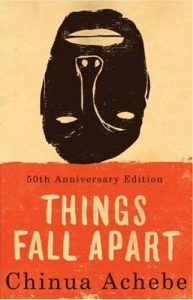Resource Title
Things Fall Apart
Summary
CHINUA ACHEBE’s “Things Fall Apart” is Africa’s best known work of literature and is accepted as the first great post-colonial novel. It has been translated into 50 languages and has sold 10 million copies.
Resource Details
Description
Africa was on the cusp of change when the book first came out in 1958. A handful of African countries had already achieved independence, but few people could have predicted the change that was to take place on the Continent.
Set amid the scramble for Africa in the 1890’s, Things Fall Apart is about the clash between white colonialists and the indigenous people of Nigeria, detailing the destructive impact of European Christianity on Igbo culture.
The main character Okonkwo is an influential and well-respected man in his own community, but cannot cope with the changes imposed upon his people. Without portraying Ibo society as perfect, Achebe describes a well-ordered and self-sufficient world where “things” only begin to “fall apart” with the arrival of the Europeans.
Mr Achebe gave Okonkwo, a famed wrestler, a heroic character. But he is mostly alone in trying to defend the traditional society in which he was born, and when his efforts fail, Okonkwo hangs himself.
The book informed the outside world about African cultures and traditions, however Achebe also wanted to remind Africans of the value of their heritage. He deliberately wrote the book in English as he wanted westerners to read his novel and learn from it. It is one of the most widely read books of the 20th century.
It was partly written as a response to offensive texts about Africa, which typically portrayed its people as primitive beings speaking Pidgin English. Among his most influential work is the essay “An Image of Africa: Racism in Conrad’s Heart of Darkness” (1975), which accuses Conrad of dehumanising Africans and rendering their Continent as “a metaphysical battlefield devoid of all recognisable humanity, into which the wandering European enters at his peril”.
The Author – Chinua Achebe
Chinua Achebe was born in 1930 in the village of Ogidi, Nigeria, which was then a British Protectorate. A member of the Ibo people his father, a teacher in a missionary school, was an evangelical Protestant convert and placed great importance on eduction.
At school Achebe came to love English literature but became increasingly annoyed by what he considered the distorted representation of Africans. This disturbance lead to him deciding to be a writer and made him swap the name Albert (his parents christened him Albert after Prince Albert, husband of Queen Victoria) for the local name Chinua.
In his more recent works he has turned the focus of that anger from the colonial intruder on to the African corrupt leaders who inherited power and went on to abuse the hopes generated by independence.
In his books A Man of the People (1966) and Anthills of the Savannah (1987) he slams the greed and laziness of post-independence African rulers and because of this has suffered threats and periods of semi-exile from Nigeria.
After school he went on to study the arts at the University of Ibadan, and then joined the Nigerian Broadcasting Company in Lagos in 1956, going on to London to train at the BBC. During the civil war in Nigeria in the late 60’s he worked for the Biafran government service. After the war he was appointed senior research fellow at the University of Nigeria and in 1971 he became founding editor of Okike, one of Africa’s most influential literary magazines, which he edited in the US from 1972, having accepted the post of Professor of English at the University of Massachusetts.
Returning to Nigeria in 1976 Achebe became Professor of English at the University of Nigeria. In 1990 he was involved in a car accident, and has since been a paraplegic. Today he and his wife, Christie, live in New York, where he is professor of languages and literature at Bard College.
He has written more than 20 books including Things Fall Apart (1958), No Longer At Ease (1960), Arrow of God (1964), A Man Of The People (1966), Girls At War (stories, 1972); Anthills Of The Savannah (1987). Poetry: Beware Soul Brother (1971) Another Africa (1998). Essays: The Trouble with Nigeria (1983), Hopes And Impediments (1988), Home And Exile (2000).
Available from:
Things Fall Apart on Google Books.

